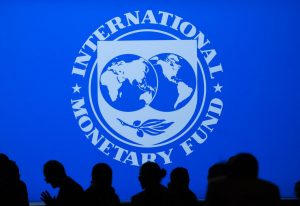Nigeria’s output growth to moderate to 3% in 2022, says IMF

An avid reader, analytical writer and consistent content creator with several enlightening articles and reports. He is currently a journalist , Commodities, Agriculture and Technology at business a.m. newspaper. Email: amugedavido@gmail.com. Tel: +234 706 930 4947
November 22, 2022356 views0 comments
The International Monetary Fund (IMF) has lowered Nigeria’s projected GDP growth for 2022 from 3.4 percent to 3 percent, citing the country’s weak oil production and the heavy impact of flooding.
The IMF also said Nigeria’s soaring headline inflation is expected to moderate at end-2022 as the start of the harvest season more than counters the projected increase in rice prices caused by recent flooding.
 The global financial institution stated this in its Staff Concluding Statement of the 2022 Article IV Mission on Nigeria released recently.
The global financial institution stated this in its Staff Concluding Statement of the 2022 Article IV Mission on Nigeria released recently.
In its assessment of Nigeria’s economic recovery amid inflationary pressure, IMF noted that the country recorded a year-over-year output growth of 3.4 percent in the second quarter of 2022, marking the seventh consecutive quarter of growth. This, it explained, was driven by agriculture and various service sectors including, information technology, trade, and finance.
Read Also:
- Africapitalism champ, Tony Elumelu joins IMF Advisory Council to drive…
- U.S. wine shipments to Nigeria hits record-high $7.8m
- The housing sector and Nigeria’s 21st century economy (2)
- Unenviable place: ‘Nigeria leads world’ in food insecurity
- PenCom approves Nine digital platforms for pension payments in Nigeria
The institution, however, warned that with the increase in Nigeria’s fiscal deficits and high debt servicing costs, public debts may rise over the medium term.
“Without bolder revenue mobilisation efforts, costly fuel subsidies and rising debt servicing costs will keep overall fiscal deficits above 6 per cent of GDP in the medium term raising public debt to about 43 per cent of GDP by 2027,” the IMF said.
“While still deemed sustainable, such a level of debt is projected to take up nearly half of general government revenues in interest payments, making the fiscal position highly vulnerable to real interest rate shocks. It also leaves little fiscal room for vital social spending on education and health, where Nigeria fares poorly compared to peer countries in sub-Saharan Africa (SSA),” it said.
Commenting on the recent consecutive increase of the Monetary Policy Rate (MPR) by the Central Bank of Nigeria (CBN), IMF lauded the policy and urged the apex bank to maintain its stance of further tightening in response to rising inflation despite a cumulative 400 basis points.
The statement also emphasised that the effects of recent flooding in Nigeria coupled with high fertilizer prices could become more entrenched in the country, impacting negatively both agricultural production and food prices in 2023. Similarly, it noted that further volatility in the parallel market exchange rate and continued dependence on central bank financing of the budget deficit could exacerbate price pressures.
“In the medium term, there are downside risks to the oil sector from possible price and production volatility, while climate-related natural disasters pose downside risks to agriculture. There are also upside risks from a stronger rebound in oil production, investment in the gas sector and Dangote refinery coming on stream with a large production capacity,” the statement added.
According to the IMF report, Nigeria requires urgent revenue mobilization and fuel subsidy reforms to create much-needed fiscal space. To achieve this, it recommended the following package of measures, which are estimated to create fiscal savings of close to 6 percentage points of GDP during 2023-27 while also making room for higher social spending:
Remove fuel subsidies and address oil theft: As a near-term priority, the IMF emphasised the urgent need to remove fuel subsidies fully and permanently, which disproportionately benefit the well-off, by mid-2023 as planned. It also urged the government to prioritize addressing oil thefts and governance issues in the oil sector to restore production to pre-pandemic levels.
Step up implementation of tax administration reforms. The Mission welcomed the steady implementation of the tax automation system (TaxPro Max) and recommended stepping up efforts to further expand coverage under a well-designed roadmap and strengthen taxpayer segmentation centring on the Large Taxpayer Offices (LTOs). In the medium term, it encouraged the authorities to develop a compliance improvement programme and comprehensive customs modernisation programme, improve the effectiveness of the State Internal Revenue Service’s administration of the Pay-As-You-Earn (PAYE) system, and strengthen inter-agency coordination and data sharing.
Adopt tax policy reforms: IMF advised Nigerian policy makers to consider adjusting tax rates to levels comparable to the average in the Economic Community of West African States (ECOWAS) as compliance improves. This, the IMF explained, includes further increasing the VAT rate to 15 percent by 2027 in steps while streamlining numerous VAT exemptions based on systemic reviews, increasing excise rates on alcoholic and tobacco products while broadening the base, and rationalising tax incentives by streamlining tax expenditures based on comprehensive periodic reviews.
Increase well-targeted social assistance: To mitigate food insecurity and cushion the impact of high inflation and fuel subsidy removal on the poor, the IMF recommended increasing social spending by up to 1.7 percentage points of GDP during 2023-27 in well-targeted programmes in coordination with the World Bank and other development partners.
To enhance a unified and market-clearing exchange rate considered a critical factor towards enhancing confidence, the mission reiterated its past recommendations to move towards a unified and market-clearing exchange rate by dismantling the various exchange rate windows at the CBN accompanied by clarity on exchange rate policy and supportive fiscal and monetary policies.
“In the medium term, the CBN should step back from its role as main FX intermediator, limiting interventions to smoothing market volatility and allowing banks to freely determine FX buy-sell rates,” it stated.
The IMF further called for structural policies to strengthen agricultural productivity and address corruption, noting that enhancing the performance of the agricultural sector is key to job creation, food security, and social cohesion going forward.
“Over the next decade, an estimated 25 million additional jobs will be needed to employ the new labor market entrants. For agriculture to continue playing a strong role in employment and ensure food security, boosting production and yields through improved input usage, especially through affordable fertilizers and higher quality seeds, better storage facilities and more coordinated policy support across government agencies are recommended,” it said.
